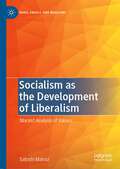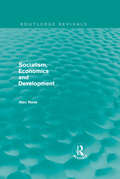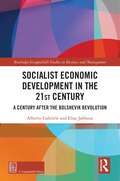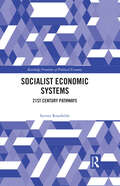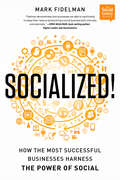- Table View
- List View
Socialism and Underdevelopment (Routledge Library Editions: Development)
by Ken Post Philip WrightIn this book, first published in 1989, Ken Post and Phil Wright provide a critical analysis of socialist construction in underdeveloped countries. Pointing out that all the socialist revolutions of the twentieth century have occurred in underdeveloped peripheral capitalist countries, they focus on the relationship between socialism and underdevelopment. They bring together the insights of both development theory and the political economy of socialism, and draw upon their direct experience of the state socialist societies as diverse as North Korea, Yugoslavia, Vietnam, and the Soviet Union.
Socialism and War: Essays, Documents, Reviews (The Collected Works of F. A. Hayek #10)
by F. A. HayekThis volume of writings by the eminent economist documents his thought on socialism and war during the dark decades of the 1930s and 1940s.Throughout the twentieth century socialism and war were intimately connected. The unprecedented upheavals wrought by the two world wars and the Great Depression provided both opportunity and impetus for a variety of socialist experiments. Socialism and War presents F.A. Hayek’s insight into these topics as it evolved over the course of decades.Opening with Hayek’s arguments against market socialism, the volume continues with his writings on the economics of war, many in response to the proposals made in John Maynard Keynes’s famous pamphlet, How to Pay for the War. The last section presents articles that anticipated The Road to Serfdom, Hayek’s classic meditation on the dangers of collectivism. An appendix contains a number of topical book reviews written by Hayek during this crucial period, and a masterful introduction by the volume editor, Bruce Caldwell, sets Hayek’s work in context.Volume ten in The Collected Works of F.A. Hayek, Socialism and War will interest anyone concerned with the ongoing debates about government intervention in the economy.
Socialism and War: Essays, Documents, Reviews (The Collected Works of F.A. Hayek #10)
by Bruce CaldwellThis volume draws on Hayek's shorter articles for weeklies, and his reviews, as well as academic papers and articles. It also includes a substantial introduction, providing full background and outlining the significance of this period for Hayek's intellectual development. The material is divided into three sections: *Hayek's contributions to the famous market socialism debate *Hayek's responses to the onset of war, including his response to Keynes' How to Pay for the War *his papers on the relationship between economic planning and freedom
Socialism and the Family
by H. G. WellsH. G. Wells is rightfully best known as a science fiction author. However he was an avowed and dedicated socialist and wrote dozens of books and tracts on the subject. His belief in Socialism greatly colored his science fiction.
Socialism as the Development of Liberalism: Marxist Analysis of Values (Marx, Engels, and Marxisms)
by Satoshi MatsuiThis book addresses the question of what socialism is according to fundamental values rather than institutions. Arguing that Marxist socialism is not only more gradual but also more radical than how it is usually understood, this book shows that socialism extends liberalism by inheriting and furthering liberal justice, including fundamental human rights. Simultaneously, socialism ultimately rejects liberalism because it does not consider liberal values, such as liberty and equality, society’s primary principles. Satoshi Matsui offers a new theory: alienation has two dimensions. Marxists seek to rectify policies that violate justice in a capitalist society, and injustice in capitalism is alienation’s first dimension. From a communist society’s perspective, however, justice itself is an alienated idea and the second dimension of alienation. Marx’s theory of alienation does not deny the liberal theory of justice but is rather a universal system that encompasses it. By fundamentally reexamining Marxism, this volume provides a basic guideline for overcoming capitalist society and constructing a communist society.
Socialism before Sanders: The 1930s Moment from Romance to Revisionism
by Jake AltmanThe early years of the twentieth century are often thought of as socialism’s first heyday in the United States, when the Socialist Party won elections across the country and Eugene Debs ran for president from a prison cell, winning more than 900,000 votes. Less well-known is the socialist revival of the 1930s. Radicalized by the contradiction of crushing poverty and unimaginable wealth that existed side by side during the Great Depression, socialists built institutions, organized the unemployed, extended aid to the labor movement, developed local political movements, and built networks that would remain active in the struggle against injustice throughout the twentieth century. Jake Altman brings this overlooked moment in the history of the American left into focus, highlighting the leadership of women, the development of the Highlander Folk School and Soviet House, and the shift from revolutionary rhetoric to pragmatic reform by the close of the decade. As another socialist revival takes shape today, this book lays the groundwork for a more nuanced history of the movement in the United States.
Socialism in Marx’s Capital: Towards a Dealienated World (Marx, Engels, and Marxisms)
by Paresh ChattopadhyayThis book explores how Marx envisaged society after capital(ism) by a close examination of the idea of socialism in the text(s) of Capital. Going beyond Marx’s critique of the Gotha Programme, Paresh Chattopadhyay challenges those who leave Capital aside in discussions of socialism in Marx’s works on the grounds that it is uniquely preoccupied with the critical analysis of capitalism. Instead, Chattopadhyay shows how Marx, in Capital, considered capitalism as a simple transitional society preparing the advent of socialism envisioned as an association of free and equal individuals.
Socialism with Chinese Characteristics: A Guide for Foreigners
by Roland BoerThis book covers the whole system of Socialism with Chinese Characteristics, dealing with Deng Xiaoping’s theory, the socialist market economy, a moderately well-off (Xiaokang) society, China’s practice and theory of socialist democracy, human rights, and Xi Jinping’s Marxism. In short, the resolute focus is the Reform and Opening-Up. Socialism with Chinese Characteristics is one of the most important global realities today. However, the concept and its practice remain largely misunderstood outside China. This book sets to redress such a lack of knowledge, by making available to non-Chinese speakers the sophisticated debates and conclusions in China concerning socialism with Chinese Characteristics. It presents this material in a way that is both accessible and thorough.
Socialism with a Human Face: Using Behavioural Economics to Understand East German Economic History (Palgrave Studies in Economic History)
by Wayne Geerling Gary B. MageeEast Germany’s economic history is typically told as a story of the unravelling of an inherently flawed system. Yet, while the system’s inefficiency is undeniable, its economic history was much richer than its comparatively poor economic performance suggests. For many who lived there, it was a system that, over its forty years, was capable of achievements and generally functioned at bearable levels. This book combines the insights of behavioural economics with archival research to peel away layers of rhetoric and assumptions about the East German economy and explore aspects of that underlying functionality. Through a series of cases studies that examine the establishment of socialist workplaces, the searches for productivity growth and efficiency, and the emergence of financial crisis, the book considers the system from the perspective of the humans who operated it and made the decisions that made it work. Unencumbered by political preconceptions, it offers a more realistic understanding of East German economic history than that derived from stagnant debates about the clash of systems. The new perspectives and approaches presented demonstrate that, extracted from its Cold War context, East Germany’s economic history can be analysed for what it was, rather than for what it symbolised.
Socialism, Economics and Development (Routledge Revivals)
by Alec NoveFirst published in 1986, this text brings together a selection of papers written by the great Alec Nove on development economics, Marxist economies, the Soviet economy, and law and politics in the Soviet Union. Reflecting the varied and diverse interests of its distinguished author, the topics range from Soviet constitutional law, to Trotsky’s view of collectivization; from a critique of conventional micro-economics, to the economic disaster of the Allende regime in Chile. The author’s long-standing immersion in the past and present of the Soviet Union helps to provide the unique insights into the workings of Socialist economies characteristic of Professor Nove’s previous work. This volume should be essential reading for anyone interested in development economics, socialist economies, or the problems facing contemporary Soviet economic reformers.
Socialism, Markets, and the Critique of Money: The Theory of “Labor Notes” (Marx, Engels, and Marxisms)
by Tsuyoshi YukiThis book provides a comprehensive overview of historical and international debates on the theory of “labor money” or “labor notes.” These debates exist in a triangular context of market socialism, communism (community-based socialism), and local currency, joining numerous socialists, anarchists, and Marx and Engels. Labor note theory encompasses theoretical, ideological, and practical doctrines aimed at designing a fair and desirable labor-based market or non-market economy by reforming the monetary and credit system. This theory was considered an unfeasible utopian idea in the context of orthodox Marxism, which is typically based on a historical study of surplus value doctrines. However, this book eschews Marx’s critique of “labor money” that limits the debate regarding a concrete alternative society, and instead proposes practical and gradual approaches to social reform by scrutinizing the primary sources of labor money theories and practical experiences and reconstructs their theoretical relationships.
Socialist China, Capitalist China: Social tension and political adaptation under economic globalization (China Policy Series)
by Guoguang Wu Helen LansdowneChina is currently encountering increasing social problems, together with the rise of mass discontent and public protest, despite having achieved enormous economic growth after nearly thirty years of market socialism and embracing globalization. The future of China thus depends not only on the economic progress the nation has achieved - and will achieve - but also on how the government addresses growing social tensions. Focusing on why social tensions have arisen despite economic prosperity and how the state is responding, this book presents rich, original data about many of the social challenges facing China, including rural-urban migration, unemployment, the health care crisis, the rise of religion, the desire for increased individualism, and new mass movements. It investigates governmental responses to deal with the problems including legal and political reforms and local governance innovations, throughout setting the discussion in the context of how far a traditionally ‘socialist’ nation can be integrated into global capitalism. Overall, the book provides a timely, up-to-date, and down-to-earth examination of and reflection on China’s continuing socio-economic and political transition.
Socialist Development and Public Investment in Tanzania, 1964-73
by W. Edmund ClarkWith its emphasis on rural development as opposed to urban development, Tanzania has pursued an individual path in socialist development. This work is the first empirical analysis of public investment in matters of agriculture, education, rural health, manufacturing, and commerce, comparing the actual program of investment to the strategy outlined in the Arusha Declaration of 1967. In Socialist Development and Public Investment in Tanzania 1964-1976, Dr Clark finds that Tanzania has been more successful in reorienting its program of social investment than its program of economic development. This failure stems from real differences within Tanzania, and among socialists generally, about appropriate investment strategies for a country at Tanzania's stage of development. In fact, no clear specification of an economic strategy exists and, as a result, policy has been heavily determined by the interests of the dominant political groups. It also reflects the fact that, in its initial stages, Tanzanian socialism was not a mass movement. It was imposed from the top and consequently, the bureaucracy remains relatively immune from the pressures of the people and the poverty in which they live. Dr Clark argues that Nyerere's basic strategy is appropriate to Tanzania at a stage when it lacks the resources to pursue the traditional socialist goal of an integrated industrial economy, but that the implementation of this strategy should and must be improved. Skillfully blending political and social with economic analysis, he provides a provocative interpretation of socialist investment strategy in Tanzania and provides an illuminating perspective on the economics of developing countries.
Socialist Dilemmas: East and West
by Henryk Flakierski Thomas T. SekineThis book, consisting of eight related articles, deals with several dimensions of socialism in the 1980s just before the beginning of the great changes which took place in Eastern Europe. Profound changes in the political economy of the world in the 1970s led to a decline of over-confidence and over-optimism characteristic of the earlier times both in the West and in the East. The painful experience of stagnation ended the grand Keynesian dream and led to the return of neo-conservatism in the West. The disappointing pace of industrial and technological progress during the Brezhnev era and increasing shortages of productivity of communism in the East. With both sides in the grip of political and economic uncertainties, the ideological confrontation seemed to have lost much of its sharp edge. No longer did the accepted dogmas and ideologies of the past appear either valid or convincing. The presupposition of the debate on comparative economic systems were in need of fundamental revisions. It was in this perspective that the Political Economy Workshop at York University undertook to feature a series of lectures on socialism in its 1988 sessions. Of about a dozen presentations by York University scholars and invited speakers, eight were subsequently made available in the form of articles and are published in this volume. These articles cover a wide range of issues, both theoretical and practical, and from both the Western and the Eastern perspective. It is recognized by all authors that neither the East European experiments in communism nor the Western process into social democracy have been a great success. The clue to what might lie beyond the socialist dilemmas in the age of perestroika will be found only by going through once again to the circumstances which led to the failure of socialism thus far.
Socialist Economic Development in the 21st Century: A Century after the Bolshevik Revolution (Routledge-Giappichelli Studies in Business and Management)
by Alberto Gabriele Elias JabbourOver a hundred years after the first socialist revolution broke the global monopoly of capitalism, a new class of socialist-oriented socioeconomic development is coming to the fore. Capitalism is still dominant worldwide, although its hegemony is no longer undisputed, and humankind is now faced with a key existential challenge. This book proposes an alternative path to overcoming the worldwide crisis of globalized capitalism. It offers a novel, balanced and historically rooted interpretation of the successes and failures of socialist economic construction throughout the last century. The authors apply a multidisciplinary, holistic and purpose-based methodology to draw basic lessons from stylized facts, emerging in different areas of knowledge, ranging from political economy to biology, and from key national socioeconomic experiences, with a particular focus on China. The book is divided into three parts. The first is mainly theoretical and general in nature, identifying the major contributions bequeathed by the hard sciences to their social counterparts. Consistent with these findings, the authors offer a stylized interpretation of the contemporary state-of-the-art of the debate on the core concepts of economic science and advance a few elementary theories about what socialism in the 21st century could look like. The second and third parts analyze and discusses the core features of a few select experiences, which have evolved in certain countries since 1917, some of which are still unfolding. The book will find an audience among academics, researchers and students in the fields of economics, political science, history, and geography, as well as, policy makers, particularly in developing countries.
Socialist Economic Systems: 21st Century Pathways (Routledge Frontiers of Political Economy)
by Steven RosefieldeBernie Sanders’ socialist advocacy in the United States, communist China’s economic successes and a Marxist revival are inspiring many to muse about improved strategies for building superior socialist futures. Socialist Economic Systems provides an objective record of socialism’s promises and performance 1820-2022, identifies a feasible path forward and provides a rigorous analytic framework for the comparison of economic systems. The book opens by surveying pre-industrial utopias from Plato to Thomas More, and libertarian communal designs for superior living. It plumbs all aspects of the revolutionary and democratic socialist political movements that emerged after 1870 and considers the comparative economic, political and social performance of the USSR and others from the Bolshevik Revolution onwards. The book also provides case studies for all revolutionary Marxist-Leninist regimes, and supplementary discussions of Mondragon cooperatives, Israeli kibbutzim, Nordic corporatism, and European democratic socialism. It investigates the theoretical and practical complexities of command-planning, reform communism, market communism, worker economic management and egalitarianism. It examines communism as an engine of economic growth, and a mechanism for improving people’s quality of existence, including living standards, labor self-governance, egalitarianism, social justice, and prevention of crimes against humanity before addressing the perennial question of what needs to be done next. A suggested path forward is elaborated drawing lessons from the warts-and-all historical performance of socialist economies 1917-2022 and failed socialist prophesy. The evidence indicates that the key to 21st century socialism success lies in empowering workers of all descriptions to govern democratically for their mutual protection and welfare without the extraneous imposition of priorities imposed by other movements. The book is essential reading for anyone interested in Socialism, political economy, comparative economic systems and political and social history.
Socialist Economics in Yugoslavia: A Critical History (Routledge Studies in the History of Economics)
by Marko Grdešić Mislav ŽitkoThis book presents a critical history of Yugoslav socialist economics, from its inception in the late 1940s to its dissolution in the late 1980s. After the dramatic break with the Soviet Union in 1948, Yugoslavia found itself in urgent need of a third way: A socialist trajectory which would not resemble the Soviet model nor succumb to the imperatives of capitalist modernization. This monumental historical task resulted in the gradual constitution of the system of socialist self-management.This book is the first to provide a systematic response to key questions about this specifically Yugoslav form of socialist economics: How did it develop? How was it consolidated into a productive and influential academic discipline? What were the theoretical concerns and empirical procedures used by economists in order to create a modern scientific discipline and advance the cause of socialist Yugoslavia? And finally, how did this body of work enter a terminal crisis and disappear simultaneously with the country itself? Even given its failure, socialist Yugoslavia constitutes one of the more important and sustained twentieth-century attempts at building socialism. Thus, the Yugoslav way of thinking remains relevant for contemporary topics such as economic democracy, comparative economic systems and post-capitalist economic models.This book will appeal to all readers interested in the history of economics, economic sociology, political economy, the history of Yugoslavia and socialist debates.
Socialist Economies and the Transition to the Market: A Guide
by Ian JeffriesFirst published in 1993. Routledge is an imprint of Taylor & Francis, an informa company.
Socialist Optimism: An Alternative Political Economy for the Twenty-First Century
by Paul AuerbachSocialist Optimism.
Socialist Optimism: An Alternative Political Economy for the Twenty-First Century
by Paul AuerbachPaul Auerbach's Socialist Optimism offers an alternative political economy for the twenty-first century. Present-day capitalism has generated growing inequality of income and wealth, persistent high levels of unemployment and ever-diminishing prospects for young people. But in the absence of a positive vision of how society and the economy might develop in the future, the present trajectory of capitalism will never be derailed, no matter how acute the critique of present-day developments. The detailed blueprint presented here focuses upon the education and upbringing of children in the context of social equality and household security. It yields a well-defined path to human development and liberation, as well as democratic control of working life and public affairs. Socialism as human development gives a unity and direction to progressive policies that are otherwise seen to be a form of pragmatic tinkering in the context of a pervasive capitalist reality.
Socialist Practice: Histories and Theories (Marx, Engels, and Marxisms)
by Victor WallisThe level of popular discontent—in the United States as elsewhere—has shown a dramatic increase in recent years, but has yet to crystallize into a cohesive anti-capitalist political force. Socialist Practice aims to contribute to a popular movement for socialism. It does so by 1) revisiting, under present conditions, longstanding questions of Marxist theory and revolutionary history, and 2) illustrating the range of issues, activities, and forms of expression that can both inform and be informed by a Marxist approach. Essays spanning a range of national experiences address the crying need to generate a society-wide awakening, grounded in purposeful discussion among all those (the vast majority) whose interests are ill-served by continuation of the status quo.
Socialist Unemployment: The Political Economy of Yugoslavia, 1945-1990
by Susan L. WoodwardIn the first political analysis of unemployment in a socialist country, Susan Woodward argues that the bloody conflicts that are destroying Yugoslavia stem not so much from ancient ethnic hatreds as from the political and social divisions created by a failed socialist program to prevent capitalist joblessness. Under Communism the concept of socialist unemployment was considered an oxymoron; when it appeared in postwar Yugoslavia, it was dismissed as illusory or as a transitory consequence of Yugoslavia's unorthodox experiments with worker-managed firms. In Woodward's view, however, it was only a matter of time before countries in the former Soviet bloc caught up with Yugoslavia, confronting the same unintended consequences of economic reforms required to bring socialist states into the world economy. By 1985, Yugoslavia's unemployment rate had risen to 15 percent. How was it that a labor-oriented government managed to tolerate so clear a violation of the socialist commitment to full employment? Proposing a politically based model to explain this paradox, Woodward analyzes the ideology of economic growth, and shows that international constraints, rather than organized political pressures, defined government policy. She argues that unemployment became politically "invisible," owing to its redefinition in terms of guaranteed subsistence and political exclusion, with the result that it corrupted and ultimately dissolved the authority of all political institutions. Forced to balance domestic policies aimed at sustaining minimum standards of living and achieving productivity growth against the conflicting demands of the world economy and national security, the leadership inadvertently recreated the social relations of agrarian communities within a postindustrial society.
Socialize Your Patient Engagement Strategy: How Social Media and Mobile Apps Can Boost Health Outcomes
by John Mack Letizia AffinitoSocialize Your Patient Engagement Strategy makes the case for a fundamentally new approach to healthcare communication; one that mobilizes patients, healthcare professionals and uses new media to enable gathering, sharing and communication of information to achieve patient-centricity and provide better value for both organizations (in terms of profit) and patients (in terms of better service and improved health). Letizia Affinito and John Mack focus on three priority areas for actions: Improving Health Literacy (e.g. web sites; targeted mass digital campaigns), Improving Self-care (e.g. self-management education; self-monitoring; self-treatment), Improving Patient Safety (e.g. adherence to treatment regimens; equipping patients for safer selfcare). The authors explain the healthcare context to the digital communications revolution; the emerging digital marketing and communications techniques that enable this revolution and the core elements behind a patient-driven digital strategy. Drawing on the authors’ research and consulting practices, as well as on the practical experience of managers in medium-large companies worldwide, the book provides a proven framework for improving the development and implementation of patient-centered digital communication programs in healthcare organizations. It is an engaging how-to/how-not-to book which includes tips, advice, and critical reviews that every stakeholder dealing with the healthcare system must have in order to participate in the evolving healthcare system and be more active in making strategic patient-centered choices. Socialize Your Patient Engagement Strategy includes interviews with experts and leading case histories of successful digital communication programs in the healthcare arena. While there are books that focus on specific healthcare communicators within different types of organizations, in their book the authors recognize that effective patient-centric communication crosses all organizational boundar
Socialized!: How the Most Successful Businesses Harness the Power of Social
by Mark FidelmanMost companies today realize the imperative to connect with their customers, employees, and partners through social technologies--Facebook, Twitter, Google+, YouTube, and elsewhere. But a huge challenge is still in the way: how to build programs and teams for accomplishing all that. While organizations have been fixated on how to use the latest social tool, they've lost sight of how to create a talent pool capable of adjusting to the next wave of technology around the corner. For corporations to successfully transform into social business enterprises they must shift the focus from computers and tools to developing skills and attitudes around technology. Socialized! represents a "playbook" on how to create such a high-performing social enterprise. Filled with clear strategies and real-life stories from visionaries and change makers, the book is designed to help leaders motivate employees throughout the organization to adopt a "social" mindset, ensuring success against the competition.




